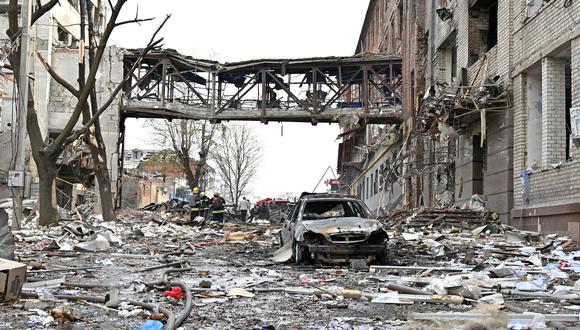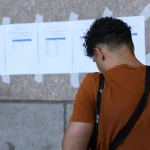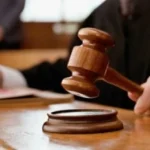Faced with the unprecedented sanctions against Moscow by Western countries and their growing military support for Ukraine, the head of Russian diplomacy, Sergey Lavrov, warned that “the danger (of a world war) is serious, it is real, it cannot be underestimated. ”.
Lavrov also accused Ukrainian President Volodymyr Zelensky of “pretending” that he is negotiating. “He is a good actor (…), if he observes himself carefully and carefully reads what he says, thousands of contradictions will be found,” he indicated.
“Goodwill has limits. And if it is not reciprocal, it does not contribute to the negotiation process (…) But we will continue to hold negotiations with the team sent by Zelensky”, he was quoted as saying by Russian agencies.
Since the beginning of the war, more than two months ago, Zelensky has incessantly asked his Western allies for heavy weapons in order to counter Russia’s theoretical military superiority.
The calls seem to have an echo. Several NATO countries have pledged in recent days to provide Ukraine with heavy weapons and equipment, despite protests from Moscow.
– Visit by US authorities –
This growing support was evidenced by the visit to kyiv on Sunday by two top US officials, Pentagon chief Lloyd Austin and Secretary of State Antony Blinken, who met for three hours with Zelensky.
“The first thing to win is to believe that you can win. And they are convinced that they can win,” Austin told reporters after the match. “They can win if they have good equipment, the right support,” he added.
In an evening speech, President Zelensky considered that the Ukrainian victory was a matter of time and stated that “thanks to the courage” of his people, Ukraine “is a true symbol of the struggle for freedom”.
During the visit, Austin and Blinken announced an additional $700 million in military aid, bringing the total US contribution to $3.4 billion.
“We want to see Russia weakened to the point where it can’t do the kind of things it has done by invading Ukraine,” Austin said after returning to Poland on Monday.
Adding to this support, Britain will send a “small quantity” of Stormer anti-aircraft armored rocket launchers, the defense minister said.
The United States took advantage of the visit to Zelensky to announce the gradual reopening of its embassy in kyiv and the upcoming appointment of its current ambassador to Slovakia, Bridget Brink, as head of this mission, a position that has been vacant since 2019.
– Russia denounces border attacks –
On the front lines, now shifting to eastern and southern Ukraine, fighting continued to rage and cast a shadow over Orthodox Easter celebrations.
On Monday, at least five people died and 18 were injured in attacks on railway facilities in the Vinnytsia region (central-west), an important hub through which most international trains pass in this country.
For his part, the governor of the Russian region of Belgorod, bordering Ukraine, accused kyiv of shelling a village, injuring two civilians and damaging two houses.
Russia has repeatedly accused Ukraine of attacking its territory, specifically against two villages in Belgorod and a village in the Briansk region.
Russian authorities also reported a fire of undetermined origin at a fuel depot in Bryansk, which serves as a logistics base for its forces, and the shooting down of two drones in the Kursk region, also bordering Ukraine.
The Russian Defense Ministry claimed that its air force struck 82 military targets, including four command posts and two oil depots. They also claim to have hit 27 targets with high-precision missiles.
For its part, the Ukrainian ministry stated that Russia is attacking the infrastructure and supply lines of its partners’ military aid.
Fighting also continues in the Kharkov region (Ukraine’s second largest city, northeast), where daily bombardments have forced civilians, for weeks, to sleep in underground shelters.
– EU helps the ICC –
The conflict that began with the Russian invasion on February 24 has entered its third month with an indefinite toll of thousands of deaths, more than five million exiles and millions more internally displaced by the violence.
The bloodiest fighting has occurred in the port city of Mariúpol (southeast), on the Sea of Azov, almost totally controlled by the Russians, although thousands of people resist in precarious conditions at the Azovstal sidewalk plant.
Ukraine accused the Russian forces of maintaining hostilities against the complex despite the fact that Vladimir Putin ordered not to attack and Russia assures that kyiv prevents the departure of its soldiers and civilians through the enabled humanitarian corridors.
The city is key to Moscow’s plans to open a land bridge between the pro-Russian breakaway territories of Donbas and the Crimean peninsula, annexed since 2014.
The conflict also severed all diplomatic collaboration between Russia and Western countries. On Monday, Moscow announced the expulsion of 40 German diplomats in retaliation for a similar move in early April by Germany following the start of the Russian offensive.
In The Hague, the International Criminal Court Prosecutor’s Office announced that it will participate in the European Union’s investigation into possible international crimes committed in Ukraine.
In this context, the UN Secretary General, António Guterres, will visit Turkey on Monday, a country that is trying to mediate in the conflict, before going to Moscow and then to kyiv on Tuesday.
















